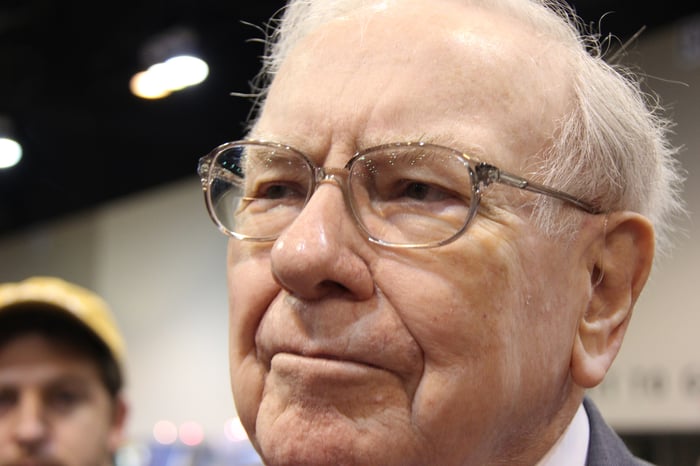For nearly six decades, Berkshire Hathaway (BRK.A -0.30%) (BRK.B -0.26%) CEO Warren Buffett has been cementing his legacy on Wall Street. Without any fancy charting tools or proprietary software, the Oracle of Omaha has overseen an aggregate return of 3,787,464% for his company's Class A shares (BRK.A) since taking the reins.
The reason investors closely follow Warren Buffett is because he's transparent and completely willing to share the factors that have led to his and his company's overwhelming success. For example, sticking with profitable, brand-name companies that have trusted management teams has been a formula for success more often than not for the Oracle of Omaha.

Berkshire Hathaway CEO Warren Buffett. Image source: The Motley Fool.
But leaning on time as an ally has probably been Buffett's greatest differentiator. Whereas the average holding period for stocks in 2022 was a mere 10 months, according to an analysis from eToro, Warren Buffett and his team buy stakes in businesses with the intent of holding those positions for years, if not decades. Allowing his investment thesis to develop over time is a key reason for Berkshire Hathaway's outperformance.
As of the end of 2022, Berkshire Hathaway had stakes in 49 securities (47 stocks and two exchange-traded funds). The average length of time held for every single owned security was 27.27 quarters, or nearly seven years, according to WhaleWisdom.com.
However, Berkshire Hathaway has continuously held the following three brand-name companies longer than any others.
Coca-Cola: Continuous holding for 35 years
If there's a stock that's an absolute fixture in Warren Buffett's portfolio, it's beverage giant Coca-Cola (KO 0.31%). The Oracle of Omaha began building his company's position in Coca-Cola in 1988, and it's been a continuous holding ever since.
Coca-Cola might not be the growth story it was in the 1990s, but it continues to slowly, steadily move the profit needle in the right direction. This is due to its virtually unsurpassed geographic diversity and top-tier marketing.
In terms of the former, Coca-Cola has 26 brands generating at least $1 billion in annual sales and is currently operating in all but three countries globally (North Korea, Cuba, and Russia). Being this globally diverse allows the company to benefit from exceptionally predictable cash flow in developed markets as well as higher organic growth rates in emerging markets.
In terms of marketing, Coca-Cola is spending over half of its media budget in the digital arena, as well as relying on artificial intelligence (AI) to reach a younger audience. At the same time, it's leaning on well-known brand ambassadors and its holiday tie-ins to connect with mature consumers. Coca-Cola's marketing is why it's arguably the most-recognized consumer goods brand in the world.
With Coca-Cola recently increasing its dividend for a 61st consecutive year, Berkshire Hathaway is now collecting $736 million in annual dividend income. Relative to Berkshire's cost basis, the $1.84/share Coke is paying out annually equates to a nearly 57% yield on cost. In other words, don't look for Buffett to close this position anytime soon.
American Express: Continuous holding for 30 years
Another stock that Warren Buffett has been holding for a long time is credit-services provider American Express (AXP -0.84%). The Oracle of Omaha began building Berkshire Hathaway's stake in AmEx back in 1993.
There isn't a sector Buffett is more confident or comfortable investing in than financials. The reason he gravitates to financial stocks is their cyclical ties. Despite the fact that cyclical companies struggle during recessions, economic downturns tend to be short-lived. By comparison, periods of expansion last much longer, which is what allows financial stocks like American Express to grow in lockstep with the U.S. and global economies over the long run.
AmEx's secret sauce is the company's ability to double dip. As I've previously pointed out, in addition to collecting fees from merchants as the third-largest payment processor by credit card network purchase volume in the U.S., American Express also acts as a lender. This allows it to collect both cardholder fees and interest income, which can pump up its profits during extended periods of economic expansion.
Another reason the Oracle of Omaha has likely stuck with American Express is the company's clientele. AmEx has a knack for attracting individuals and couples with high incomes. The advantage of high-earning customers is that they're less likely to change their spending habits during minor economic downturns. They're also more likely to continue paying their bills on time. As long as AmEx can attract high earners, it shouldn't have any trouble bouncing back from recessions faster than most lending institutions.
It's also worth mentioning that American Express is providing Berkshire Hathaway with a hefty annual dividend. Buffett's company is collecting about $363.9 million in yearly income from its stake in American Express. With a yield relative to cost of more than 28%, Buffett has no incentive to sell Berkshire's position in AmEx.

Image source: Getty Images.
Moody's: Continuous holding for 23 years
The third stock that's been a veritable foundation for Berkshire Hathaway's investment portfolio is credit-rating agency Moody's (MCO -1.58%), which has been a continuous holding since 2000 -- i.e., when it was spun off from Dun & Bradstreet.
Moody's fits the bill as a financial stock that's delivered more often than not for the Oracle of Omaha since the century began. Both of the company's core operating segments -- Moody's Investment Services (MIS) and Moody's Analytics -- have played unique roles in fueling Moody's share price appreciation.
Moody's is probably best known for assessing the credit quality of various types of bonds and loans via its MIS segment. With the Federal Reserve keeping interest rates at or near historic lows for nearly 13 years following the Great Recession, MIS was kept busy evaluating new bond and loan issuances. However, with the nation's central bank aggressively fighting back against historically high inflation and raising interest rates at the fastest clip in four decades, new bond issuances have notably declined.
Moody's Analytics segment is poised to shine. This segment is designed to help businesses assess risk and maintain corporate compliance. Considering that the latest meeting minutes from the Federal Open Market Committee call for a "mild recession" later this year, risk management is more important than ever.
To boot, Moody's Analytics has successfully transitioned to a high-margin operating model driven by subscription revenue. Last year, 94% of Analytics' sales came from subscriptions, with the segment enjoying a "mid-90s customer retention rate."
The cherry on the sundae is that Berkshire Hathaway's yield on cost with Moody's is also jaw-droppingly high. Even though Moody's current yield is a mere 1%, the $3.08/share it pays out in annual dividends works out to a nearly 31% yield relative to Berkshire's $10.05-per-share cost basis.





